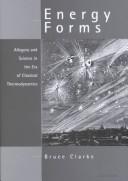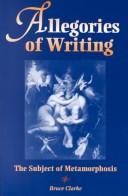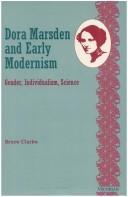| Listing 1 - 10 of 30 | << page >> |
Sort by
|

ISBN: 0472111744 9780472111749 Year: 2001 Publisher: Ann Arbor University of Michigan Press
Abstract | Keywords | Export | Availability | Bookmark
 Loading...
Loading...Choose an application
- Reference Manager
- EndNote
- RefWorks (Direct export to RefWorks)
Literary semiotics --- Thematology --- Thermodynamics --- Allegory. --- Literature and science. --- Thermodynamics.

ISBN: 0791426246 Year: 1995 Volume: *4 Publisher: Albany, N.Y. State University of New York Press
Abstract | Keywords | Export | Availability | Bookmark
 Loading...
Loading...Choose an application
- Reference Manager
- EndNote
- RefWorks (Direct export to RefWorks)

ISBN: 0472106465 Year: 1995 Publisher: Ann Arbor, Mich. University of Michigan Press
Abstract | Keywords | Export | Availability | Bookmark
 Loading...
Loading...Choose an application
- Reference Manager
- EndNote
- RefWorks (Direct export to RefWorks)
Marsden, Dora --- Editors --- Authors, English --- English periodicals --- Feminism --- Literature and science --- Modernism (Literature) --- Biography. --- History --- Biography
Book
ISBN: 3030364860 3030364852 Year: 2020 Publisher: Cham : Springer International Publishing : Imprint: Palgrave Macmillan,
Abstract | Keywords | Export | Availability | Bookmark
 Loading...
Loading...Choose an application
- Reference Manager
- EndNote
- RefWorks (Direct export to RefWorks)
This volume presents the first collection of essays dedicated to the science fiction of microbiologist Joan Slonczewski. Posthuman Biopolitics consolidates the scholarly literature on Slonczewski’s fiction and demonstrates fruitful lines of engagement for the critical, cultural, and theoretical treatment of her characters, plots, and storyworlds. Her novels treat feminism in relation to scientific practice, resistance to domination, pacifism versus militarism, the extension of human rights to nonhuman and posthuman actors, biopolitics and posthuman ethics, and symbiosis and communication across planetary scales. Posthuman Biopolitics explores the breadth and depth of Joan Slonczewski’s vision, uncovering the reflective ethical practice that informs her science fiction.
Humanism in literature. --- Literature, Modern—20th century. --- Literature, Modern—21st century. --- Fiction. --- America—Literatures. --- Technology in literature. --- Bioethics. --- Film genres. --- Contemporary Literature. --- North American Literature. --- Literature and Technology/Media. --- Genre. --- Genre films --- Genres, Film --- Motion picture genres --- Motion pictures --- Biology --- Biomedical ethics --- Life sciences --- Life sciences ethics --- Science --- Fiction --- Metafiction --- Novellas (Short novels) --- Novels --- Stories --- Literature --- Novelists --- Plots, themes, etc. --- Moral and ethical aspects --- Philosophy --- Literature, Modern --- America --- Literature and technology. --- Mass media and literature. --- Fiction Literature. --- Literature and Technology. --- Genre Studies. --- Literature and mass media --- Industry and literature --- Technology and literature --- Technology --- 20th century. --- 21st century. --- Literatures.
Book
ISBN: 9780823228508 9780823228515 0823228509 0823228517 0823241122 0823246698 1282698796 9786612698798 082323813X 0823228495 0823228479 0823228487 0823248372 0823240991 Year: 2008 Publisher: New York Fordham University Press
Abstract | Keywords | Export | Availability | Bookmark
 Loading...
Loading...Choose an application
- Reference Manager
- EndNote
- RefWorks (Direct export to RefWorks)
Judith H. Anderson conceives the intertext as a relation between or among texts that encompasses both Kristevan intertextuality and traditional relationships of influence, imitation, allusion, and citation. Like the Internet, the intertext is a state, or place, of potential expressed in ways ranging from deliberate emulation to linguistic free play. Relatedly, the intertext is also a convenient fiction that enables examination of individual agency and sociocultural determinism. Anderson’s intertext is allegorical because Spenser’s Faerie Queene is pivotal to her study and because allegory, understood as continued or moving metaphor, encapsulates, even as it magnifies, the process of signification. Her title signals the variousness of an intertext extending from Chaucer through Shakespeare to Milton and the breadth of allegory itself. Literary allegory, in Anderson’s view, is at once a mimetic form and a psychic one—a process thinking that combines mind with matter, emblem with narrative, abstraction with history. Anderson’s first section focuses on relations between Chaucer’s Canterbury Tales and Spenser’s The Faerie Queene, including the role of the narrator, the nature of the textual source, the dynamics of influence, and the bearing of allegorical narrative on lyric vision. The second centers on agency and cultural influence in a variety of Spenserian and medieval texts. Allegorical form, a recurrent concern throughout, becomes the pressing issue of section three. This section treats plays and poems of Shakespeare and Milton and includes two intertextually relevant essays on Spenser.How Paradise Lost or Shakespeare’s plays participate in allegorical form is controversial. Spenser’s experiments with allegory revise its form, and this intervention is largely what Shakespeare and Milton find in his poetry and develop. Anderson’s book, the result of decades of teaching and writing about allegory, especially Spenserian allegory, will reorient thinking about fundamental critical issues and the landmark texts in which they play themselves out.
Cyborgs in literature --- Human body in literature --- Fantasy literature --- History and criticism --- Cyborgs in motion pictures --- Human body in motion pictures --- Fantastic literature --- Literature --- Body, Human, in literature --- Human figure in literature --- Body, Human, in motion pictures --- Motion pictures --- English literature --- Intertextuality. --- Symbolism in literature. --- Influence (Literary, artistic, etc.) --- Criticism --- Semiotics --- Signs and symbols in literature --- Symbolism in folk literature --- Artistic impact --- Artistic influence --- Impact (Literary, artistic, etc.) --- Literary impact --- Literary influence --- Literary tradition --- Tradition (Literature) --- Art --- Influence (Psychology) --- Intermediality --- Intertextuality --- Originality in literature --- Theory, etc. --- Spenser, Edmund, --- Chaucer, Geoffrey, --- Shakespeare, William, --- Milton, John, --- Milṭan, Jān, --- Milʹton, Dzhon, --- Милтон, Джон, --- Miltūn, Zhūn, --- Miltonus, Joannes, --- J. M. --- M., J. --- Milʹton, Īoann, --- Milton, Gioanni, --- Milton, Giovanni, --- מילטאן, יאהאן --- מילטאן, יוחנן --- מילטון, ג׳והן --- מלטן, יוחנן --- Criticism and interpretation. --- Fantasy literature - 20th century - History and criticism
Book
ISBN: 9781517909123 Year: 2020 Publisher: Minneapolis (Minn.) : University of Minnesota press,
Abstract | Keywords | Export | Availability | Bookmark
 Loading...
Loading...Choose an application
- Reference Manager
- EndNote
- RefWorks (Direct export to RefWorks)
"A groundbreaking look at Gaia theory's intersections with neocybernetic systems theory"--
Cybernetics. --- Cybernetics. --- Gaia hypothesis. --- Gaia hypothesis. --- System theory. --- System theory. --- Margulis, Lynn, --- Margulis, Lynn,
Book
ISBN: 0816691029 1322305374 1452942153 Year: 2014 Publisher: University of Minnesota Press
Abstract | Keywords | Export | Availability | Bookmark
 Loading...
Loading...Choose an application
- Reference Manager
- EndNote
- RefWorks (Direct export to RefWorks)
Book
ISBN: 9780816691005 9780816691029 Year: 2014 Publisher: Minneapolis, Minn. University of Minnesota Press
Abstract | Keywords | Export | Availability | Bookmark
 Loading...
Loading...Choose an application
- Reference Manager
- EndNote
- RefWorks (Direct export to RefWorks)
Fiction --- Literary rhetorics --- Thematology
Digital
ISBN: 9783030364861 Year: 2020 Publisher: Cham Springer International Publishing :Imprint: Palgrave Macmillan
Abstract | Keywords | Export | Availability | Bookmark
 Loading...
Loading...Choose an application
- Reference Manager
- EndNote
- RefWorks (Direct export to RefWorks)
This volume presents the first collection of essays dedicated to the science fiction of microbiologist Joan Slonczewski. Posthuman Biopolitics consolidates the scholarly literature on Slonczewski’s fiction and demonstrates fruitful lines of engagement for the critical, cultural, and theoretical treatment of her characters, plots, and storyworlds. Her novels treat feminism in relation to scientific practice, resistance to domination, pacifism versus militarism, the extension of human rights to nonhuman and posthuman actors, biopolitics and posthuman ethics, and symbiosis and communication across planetary scales. Posthuman Biopolitics explores the breadth and depth of Joan Slonczewski’s vision, uncovering the reflective ethical practice that informs her science fiction.
Professional ethics. Deontology --- Engineering sciences. Technology --- Film --- Fiction --- American literature --- Literature --- film --- literatuur --- bio-ethiek --- medische ethiek --- fantasie (verbeelding) --- anno 1900-1999 --- anno 2000-2099 --- America
Book
ISBN: 0823265285 0823265277 Year: 2015 Publisher: New York, NY : Fordham University Press,
Abstract | Keywords | Export | Availability | Bookmark
 Loading...
Loading...Choose an application
- Reference Manager
- EndNote
- RefWorks (Direct export to RefWorks)
Exploring the broad implications of evolutionary theorist Lynn Margulis’s work, this collection brings together specialists across a range of disciplines, from paleontology, molecular biology, evolutionary theory, and geobiology to developmental systems theory, archaeology, history of science, cultural science studies, and literature and science. Addressing the multiple themes that animated Margulis’s science, the essays within take up, variously, astrobiology and the origin of life, ecology and symbiosis from the microbial to the planetary scale, the coupled interactions of earthly environments and evolving life in Gaia theory and earth system science, and the connections of these newer scientific ideas to cultural and creative productions.Dorion Sagan acquaints the reader with salient issues in Lynn Margulis’s scientific work, the controversies they raised, and the vocabulary necessary to follow the arguments. Sankar Chatterjee synthesizes several strands of current theory for the origin of life on earth. James Strick tells the intertwined origin stories of James Lovelock’s Gaia hypothesis and Margulis’s serial endosymbiosis theory. Jan Sapp explores the distinct phylogenetic visions of Margulis and Carl Woese. Susan Squier examines the epigenetics of embryologist and developmental biologist C. H. Waddington. Bruce Clarke studies the convergence of ecosystem ecology, systems theory, and science fiction between the 1960s and the 1980s. James Shapiro discusses the genome evolution that results not from random changes but rather from active cell processes. Susan Oyama shows how the concept of development balances an over-emphasis on genetic coding and other deterministic schemas. Christopher Witmore studies the ways in which a concentrated animal feeding operation, or CAFO, mixes up natural resources, animal lives, and human appetites. And Peter Westbroek brings the insights of earth system science toward a new worldview essential for a proper response to global change.
Evolution (Biology) --- Biodiversity. --- Gaia hypothesis. --- Convergence (Biology) --- Philosophy. --- Biology. --- Earth Sciences. --- Ecosystems. --- Evolution. --- Gaia Theory. --- Lynn Margulis. --- Microbes. --- Symbiosis. --- Systems Theory. --- ecology.
| Listing 1 - 10 of 30 | << page >> |
Sort by
|

 Search
Search Feedback
Feedback About UniCat
About UniCat  Help
Help News
News